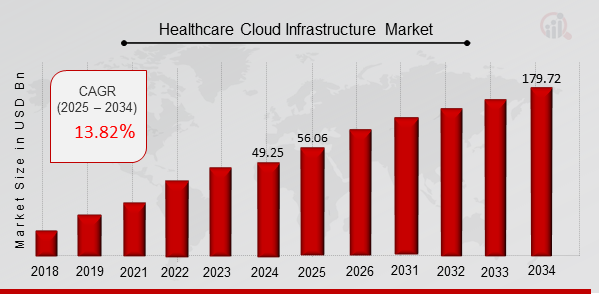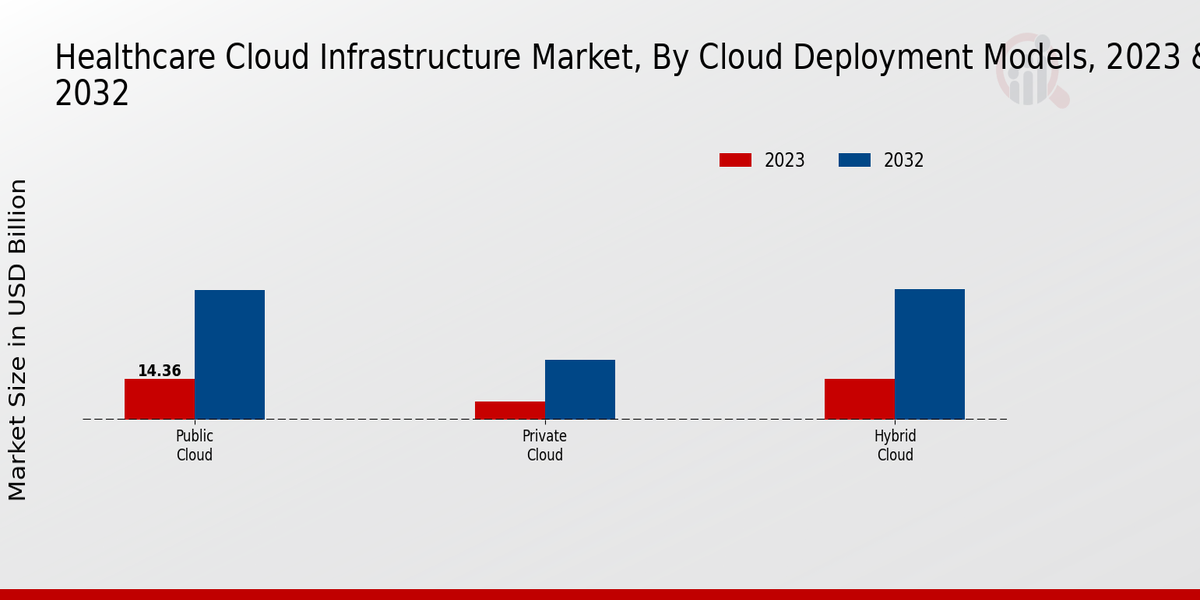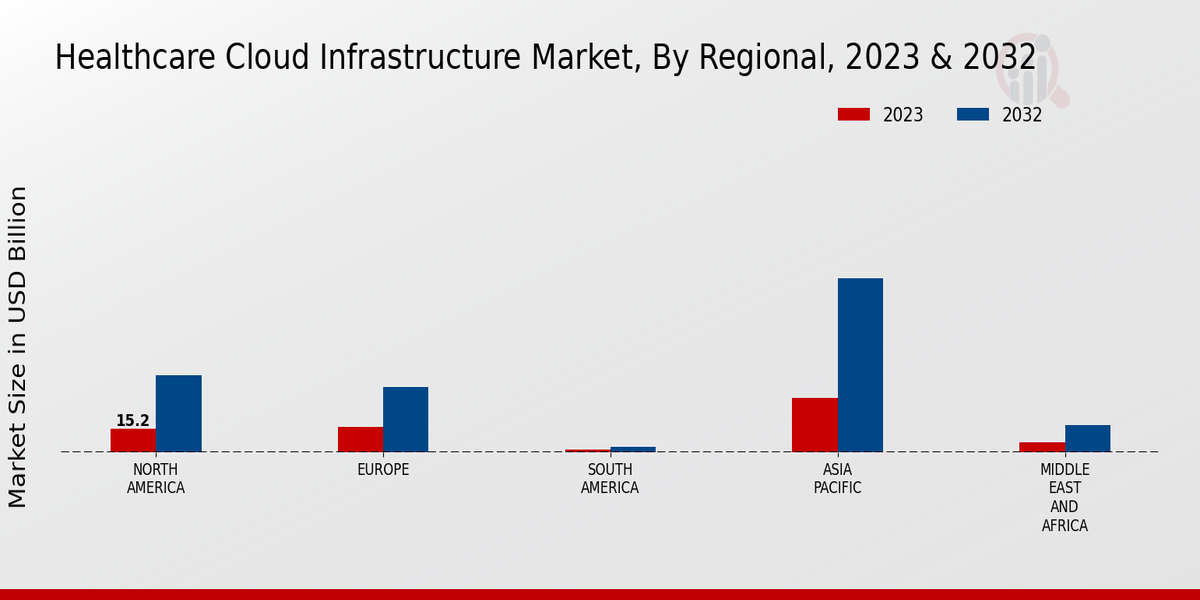Healthcare Cloud Infrastructure Market Overview
As per MRFR analysis, the Healthcare Cloud Infrastructure Market Size was estimated at 49.25 (USD Billion) in 2024. The Healthcare Cloud Infrastructure Market Industry is expected to grow from 56.06 (USD Billion) in 2025 to 179.72 (USD Billion) till 2034, at a CAGR (growth rate) is expected to be around 13.82% during the forecast period (2025 - 2034).
Key Healthcare Cloud Infrastructure Market Trends Highlighted
The Healthcare Cloud Infrastructure Market is expanding rapidly due to a surge in cloud computing adoption, driven by the need for seamless data sharing, improved healthcare accessibility, and reduced operational costs.
Key market drivers include the growing adoption of electronic health records (EHRs), the rise of telemedicine, and the increasing demand for personalized medicine.
Opportunities in the Healthcare Cloud Infrastructure Market are abundant. The integration of artificial intelligence (AI) and machine learning (ML) technologies holds immense promise for improving patient outcomes, enhancing clinical decision-making, and streamlining administrative tasks.
Cloud-based solutions also enable healthcare providers to leverage advanced analytics for population health management and precision medicine initiatives.
Recent trends in the Healthcare Cloud Infrastructure Market include the increasing adoption of hybrid and multi-cloud models, the rise of cloud-native applications, and the growing importance of data security and compliance.
Healthcare organizations are embracing hybrid cloud approaches to optimize cost, flexibility, and data control, while cloud-native applications offer scalability, agility, and enhanced performance for healthcare-specific workloads.
Data security and compliance remain critical considerations, with healthcare providers seeking encryption, access controls, and robust data governance mechanisms to protect sensitive patient information.

Source: Primary Research, Secondary Research, Market Research Future Database and Analyst Review
Healthcare Cloud Infrastructure Market Drivers
Increasing Adoption of Cloud-Based Healthcare Solutions
The healthcare industry is rapidly adopting cloud-based solutions to improve patient care, reduce costs, and increase efficiency. Cloud-based healthcare solutions offer a number of advantages over traditional on-premises solutions, including Scalability: Cloud-based solutions can be easily scaled up or down to meet the changing needs of healthcare organizations.
This flexibility is essential for organizations that are experiencing rapid growth or that need to be able to quickly respond to changes in patient demand.
Cost-effectiveness: Cloud-based solutions are often more cost-effective than traditional on-premises solutions. This is because cloud providers can spread the cost of infrastructure and maintenance across a large number of customers.
Improved security: Cloud providers invest heavily in security measures to protect customer data. This makes cloud-based solutions more secure than many on-premises solutions. The increasing adoption of cloud-based healthcare solutions is a major driver of growth in the Healthcare Cloud Infrastructure Market Industry.
This trend is expected to continue in the coming years as more and more healthcare organizations realize the benefits of cloud computing.
Growing Demand for Remote Healthcare Services
The demand for remote healthcare services is growing rapidly as patients become more comfortable with using technology to access care.
Remote healthcare services offer a number of advantages for patients, including Convenience. Remote healthcare services can be accessed from anywhere with an internet connection. This makes it easier for patients to get the care they need without having to travel to a doctor's office or hospital. Flexibility: Remote healthcare services can be scheduled at times that are convenient for patients.
This is especially important for patients who have busy schedules or who live in remote areas. Affordability: Remote healthcare services are often more affordable than traditional in-person care. This is because remote healthcare providers do not have to pay for the overhead costs of a physical office.
The growing demand for remote healthcare services is a major driver of growth in the Healthcare Cloud Infrastructure Market Industry. This trend is expected to continue in the coming years as more and more patients become comfortable with using technology to access care.
Government Initiatives to Promote Healthcare Cloud Adoption
Governments around the world are increasingly promoting the adoption of healthcare cloud solutions. This is because governments recognize the benefits that cloud computing can bring to the healthcare industry, including Improved patient care: Cloud-based healthcare solutions can help to improve patient care by providing access to more data and insights. This can help clinicians to make better informed decisions about patient care.
Reduced costs: Cloud-based healthcare solutions can help to reduce costs by improving efficiency and reducing the need for expensive hardware and software.
Increased innovation: Cloud-based healthcare solutions can help foster innovation by providing a platform for developers to create new applications and services. Government initiatives to promote healthcare cloud adoption are a major driver of growth in the Healthcare Cloud Infrastructure Market Industry.
These initiatives are expected to continue in the coming years as governments become more aware of the benefits of cloud computing.
Healthcare Cloud Infrastructure Market Segment Insights
Healthcare Cloud Infrastructure Market Cloud deployment models Insights
The Healthcare Cloud Infrastructure Market segmentation by cloud deployment models includes public cloud, private cloud, and hybrid cloud. Among these, the public cloud segment held the largest market share in 2023 and is expected to continue its dominance throughout the forecast period.
The growth of the public cloud segment can be attributed to its cost-effectiveness, scalability, and flexibility. Public cloud services offer a pay-as-you-go model, which allows healthcare organizations to avoid upfront capital investments. Additionally, public cloud providers offer a wide range of services and capabilities that can be easily integrated with existing healthcare systems.
The private cloud segment is expected to experience significant growth over the forecast period. Private clouds offer greater control and security over data and applications, which is a key concern for healthcare organizations.
Private clouds are also well-suited for organizations that have sensitive data or applications that require high levels of performance. The hybrid cloud segment is expected to grow at a steady pace over the forecast period. Hybrid clouds combine the benefits of both public and private clouds, offering flexibility, scalability, and security.
Hybrid clouds allow healthcare organizations to deploy applications and data in the most appropriate environment, depending on their specific needs.
Overall, the Healthcare Cloud Infrastructure Market is expected to grow significantly over the forecast period, driven by the increasing adoption of cloud-based solutions in the healthcare industry.

Source: Primary Research, Secondary Research, Market Research Future Database and Analyst Review
Healthcare Cloud Infrastructure Market Service Models Insights
The Healthcare Cloud Infrastructure Market is segmented based on service models into Infrastructure as a service (IaaS), Platform as a service (PaaS), and Software as a service (SaaS). Among these, the IaaS segment held the largest market share in 2023 and is expected to continue its dominance throughout the forecast period.
The growth of this segment can be attributed to the increasing demand for scalable and cost-effective IT infrastructure by healthcare organizations. The PaaS segment is also expected to witness significant growth, as it enables healthcare providers to develop and deploy healthcare applications quickly and efficiently.
The SaaS segment is expected to grow at a steady pace, as it offers a wide range of healthcare-specific software applications that can be accessed on a subscription basis.
Healthcare Cloud Infrastructure Market Healthcare Applications Insights
The Healthcare Cloud Infrastructure Market is anticipated to grow significantly over the forecast period. The increasing adoption of cloud-based solutions in the healthcare industry is a major factor driving the growth of the market.
Cloud-based solutions offer several benefits to healthcare providers, such as improved data accessibility, flexibility, and scalability. The Healthcare applications segment is expected to account for a major share of the Healthcare Cloud Infrastructure Market revenue over the forecast period.
The growing adoption of medical data analytics and storage, electronic health records (EHRs), telemedicine and remote patient monitoring, and clinical decision support systems is driving the growth of this segment.
Medical data analytics and storage solutions help healthcare providers to collect, store, and analyze large volumes of data. This data can be used to improve patient care, reduce costs, and develop new products and services. EHRs are electronic versions of patient medical records.
They offer several benefits over traditional paper-based records, such as improved accessibility, security, and accuracy. Telemedicine and remote patient monitoring solutions allow healthcare providers to provide care to patients remotely. This is especially beneficial for patients who live in rural or underserved areas.
Clinical decision support systems provide healthcare providers with information and tools to help them make better decisions about patient care.
Healthcare Cloud Infrastructure Market Organization Size Insights
The Healthcare Cloud Infrastructure Market is segmented by organization size into small and medium-sized businesses (SMBs) and large enterprises. SMBs are expected to hold a significant market share in the coming years due to the increasing adoption of cloud-based solutions to improve operational efficiency and reduce costs.
In 2023, the SMB segment is valued at USD 12.5 billion and is projected to reach USD 32.1 billion by 2032, exhibiting a CAGR of 12.3%. Large enterprises, on the other hand, are expected to witness a steady growth rate due to their focus on enhancing IT infrastructure and adopting advanced technologies to gain a competitive edge.
The large enterprise segment is estimated to account for USD 25.5 billion in 2023 and is anticipated to reach USD 89.6 billion by 2032, growing at a CAGR of 14.2%.
Healthcare Cloud Infrastructure Market Industry Vertical Insights
The Healthcare Cloud Infrastructure Market segmentation by industry vertical includes Hospitals and health systems, Clinics and ambulatory surgery centers, Pharmaceutical and biotechnology companies, and medical device manufacturers.
Among these segments, Hospitals and health systems held the largest market share in 2023 and is expected to continue its dominance throughout the forecast period. The growth of this segment can be attributed to the increasing adoption of cloud-based solutions by hospitals and health systems to improve patient care, reduce costs, and improve operational efficiency.
Clinics and ambulatory surgery centers are also expected to witness significant growth in the coming years due to the increasing demand for outpatient care and the need for more efficient and cost-effective healthcare delivery models.
Pharmaceutical and biotechnology companies are also adopting cloud-based solutions to improve drug discovery and development processes, as well as to enhance collaboration with healthcare providers. Medical device manufacturers are also increasingly using cloud-based solutions to improve product development and manufacturing processes, as well as to provide better customer service and support.
Healthcare Cloud Infrastructure Market Regional Insights
Regional Overview Regionally, North America dominated the Healthcare Cloud Infrastructure Market in 2023, accounting for over 40% of the global revenue.
The region's dominance is attributed to factors such as the presence of leading healthcare providers, well-developed healthcare infrastructure, and high adoption of cloud computing technologies.
Europe followed North America with a significant market share, driven by government initiatives promoting digital healthcare and increasing adoption of cloud-based healthcare solutions.
APAC is anticipated to exhibit the highest growth rate during the forecast period due to rising healthcare expenditure, growing awareness of cloud computing benefits, and government support for healthcare IT modernization.
South America and MEA are expected to contribute a smaller share to the overall market, but growth in these regions is projected to be driven by increasing healthcare investments and expanding access to healthcare services.

Source: Primary Research, Secondary Research, Market Research Future Database and Analyst Review
Healthcare Cloud Infrastructure Market Key Players and Competitive Insights
Major players in the the Healthcare Cloud Infrastructure Market industry are continuously developing and launching new products and services to meet the evolving needs of healthcare providers. Leading Healthcare Cloud Infrastructure Market players are also actively involved in mergers and acquisitions to expand their market reach and strengthen their competitive position.
The Healthcare Cloud Infrastructure Market development is being driven by several factors, including the increasing adoption of cloud computing in healthcare, the growing need for data storage and management, and the increasing demand for remote patient monitoring and telemedicine services.
The Healthcare Cloud Infrastructure Market Competitive Landscape is expected to remain highly competitive over the next few years, with major players continuing to invest in innovation and expansion.
Among the leading players in the Healthcare Cloud Infrastructure Market, Amazon Web Services (AWS) is a major provider of cloud infrastructure services to healthcare organizations.
AWS offers a range of services, including computing, storage, networking, and database services, that can be used to support a variety of healthcare applications. AWS also has a number of healthcare-specific solutions, such as Amazon HealthLake, which provides a secure and scalable data lake for healthcare data. Microsoft is another major player in the Healthcare Cloud Infrastructure Market.
Microsoft offers a range of cloud infrastructure services, including Azure Virtual Machines, Azure Storage, and Azure SQL Database, that can be used to support a variety of healthcare applications. Microsoft also has a number of healthcare-specific solutions, such as Azure Healthcare APIs, which provide a set of APIs for developing healthcare applications.
A competitor to AWS and Microsoft in the Healthcare Cloud Infrastructure Market is Google Cloud. Google Cloud offers a range of cloud infrastructure services, including Google Compute Engine, Google Cloud Storage, and Google Cloud SQL, that can be used to support a variety of healthcare applications.
Google Cloud also has a number of healthcare-specific solutions, such as Google Cloud Healthcare API, which provides a set of APIs for developing healthcare applications. Other major players in the the Healthcare Cloud Infrastructure Market include IBM, Oracle, and SAP.
Key Companies in the Healthcare Cloud Infrastructure Market Include
- Athenahealth
- Amazon Web Services
- Salesforce Health Cloud
- Epic Systems
- Allscripts
- Microsoft Azure
- EclinicalWorks
- VMware Cloud
- McKesson
- IBM Cloud
- Cerner
- Google Cloud
- MEDITECH
- Oracle Cloud
- NextGen Healthcare
Healthcare Cloud Infrastructure Industry Developments
-
Q1 2024: Oracle Unveils Next-Generation EHR System with Advanced Cloud and AI Capabilities Oracle launched a new Electronic Health Record (EHR) system that integrates advanced cloud and AI features, including conversational search and voice-driven navigation, aimed at improving clinician workflows and patient care efficiency.
-
Q1 2024: Eviden and Microsoft Announce Five-Year Strategic Partnership to Accelerate AI Transformation Eviden and Microsoft entered a five-year strategic partnership to integrate Microsoft Cloud and AI solutions across industries, including healthcare, supporting Eviden's strategy to expand its global network of alliances.
Healthcare Cloud Infrastructure Market Segmentation Insights
Healthcare Cloud Infrastructure Market Cloud deployment models Outlook
- Public cloud
- Private cloud
- Hybrid cloud
Healthcare Cloud Infrastructure Market Service models Outlook
- Infrastructure as a service (IaaS)
- Platform as a service (PaaS)
- Software as a service (SaaS)
Healthcare Cloud Infrastructure Market Healthcare applications Outlook
- Medical data analytics and storage
- Electronic health records (EHRs)
- Telemedicine and remote patient monitoring
- Clinical decision support systems
Healthcare Cloud Infrastructure Market Organization size Outlook
- Small and medium-sized businesses (SMBs)
- Large enterprises
Healthcare Cloud Infrastructure Market Industry Vertical Outlook
- Hospitals and health systems
- Clinics and ambulatory surgery centers
- Pharmaceutical and biotechnology companies
- Medical device manufacturers
Healthcare Cloud Infrastructure Market Regional Outlook
- North America
- Europe
- South America
- Asia Pacific
- Middle East and Africa
| Report Attribute/Metric |
Details |
| Market Size 2024 |
49.25 (USD Billion) |
| Market Size 2025 |
56.06 (USD Billion) |
| Market Size 2034 |
179.72 (USD Billion) |
| Compound Annual Growth Rate (CAGR) |
13.82 % (2025 - 2034) |
| Report Coverage |
Revenue Forecast, Competitive Landscape, Growth Factors, and Trends |
| Base Year |
2024 |
| Market Forecast Period |
2025 - 2034 |
| Historical Data |
2020 - 2024 |
| Market Forecast Units |
USD Billion |
| Key Companies Profiled |
Athenahealth, Amazon Web Services, Salesforce Health Cloud, Epic Systems, Allscripts, Microsoft Azure, EclinicalWorks, VMware Cloud, McKesson, IBM Cloud, Cerner, Google Cloud, MEDITECH, Oracle Cloud, NextGen Healthcare |
| Segments Covered |
Cloud deployment models, Service models, Healthcare applications, Organization Size, Industry Vertical, Regional |
| Key Market Opportunities |
Increasing cloud adoption Integration with IoT devices Personalized healthcare Telemedicine expansion Data security enhancements |
| Key Market Dynamics |
Increasing adoption of telemedicine Rising demand for remote patient monitoring Growth of personalized medicine Integration of AI and ML Expansion of cloud-based EHR systems |
| Countries Covered |
North America, Europe, APAC, South America, MEA |
Frequently Asked Questions (FAQ):
The Healthcare Cloud Infrastructure Market was valued at approximately 38.0 billion USD in 2023.
The Healthcare Cloud Infrastructure Market is anticipated to reach an estimated valuation of 179.72 billion USD by 2034
The Healthcare Cloud Infrastructure Market is projected to grow at a CAGR of approximately 13.82% from 2025 to 2034.
North America is anticipated to account for the largest market share in the Healthcare Cloud Infrastructure Market due to factors such as the presence of major healthcare providers and technology companies.
The Infrastructure as a Service (IaaS) segment is expected to dominate the Healthcare Cloud Infrastructure Market owing to its flexibility, scalability, and cost-effectiveness.
Major players in the Healthcare Cloud Infrastructure Market include Amazon Web Services, Microsoft Azure, Google Cloud Platform, and Oracle.

















